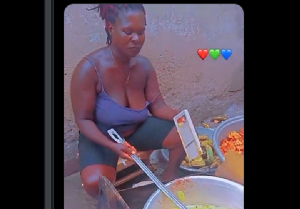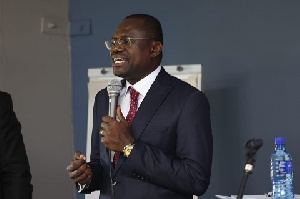People say they were friends when they were at the University of Ghana. It is also said that both belonged to the same political party while they were students at the university. Again both are lawyers of great repute; and both have, in the past, served their nation and their respective parties in positions of trust. Both of them are highly intelligent and speak English fluently.
They are both seen as elitist and removed from ordinary people. They both hail from two ethnic communities that are well renowned for their immense contributions towards the political history and development of Ghana. They could both be described as ‘angels’ or ‘demons’, depending on who is doing the description. And like you will say about the marmite, you either like or dislike either of the two, depending on where in Ghana you come from. This is the broad résumé of the two personalities who are being described in this write-up as ‘lookalikes’ and who are vying for the chance to replace the outgoing President of Ghana.
The two parties that they lead and represent have equally shared sixteen years of government since Ghana became the Fourth Republic in January 1992, with one of the two doing the first eight years that ended in January 2001 and the other doing the second eight years that end on January 7, 2009. The two parties have broad national appeal, with each dominating roughly half of the nation’s political and ethnic landscape. During their tenures of office, the two parties were generally and equally seen as having failed to eradicate corruption and poverty in Ghana. They were rather seen to have used their tenures of office to enrich members of their governments and their party affiliates. Many Ghanaians today believe that the two parties would never have any chance of forming another government in the country if it had not been for two reasons namely: the absence of a strong and credible ‘third party’; and secondly, because of the strong ethnic affiliations and loyalties that the two parties now share to the exclusion of other parties.
The two parties that the two lookalikes lead and represent have both had a chequered ancestral past. One of them developed from a group that was associated with the removal of democratic governments in the past and had gone on to create one of the most dreadful regimes in the world. The other party is a descendant of a group that once attempted to split up Ghana into either separate autonomous communities or separate semi-autonomous states within a federal unit.
Each of the two lookalikes vying for the position of the third President of the Fourth Republic of Ghana got nearly the same number of votes in the first round of the presidential election as the other had. Each of the two parties that they lead and represent also obtained around half of the number of people who will form the next legislature. This means that both lookalikes are not as lucky as their predecessors who had bigger parliamentary support that helped them to push their programmes through during their tenures of office. This, of course, means whoever succeeds to win the second round election and becomes the third President of the Fourth Republic of Ghana will need the support of members of the other party in parliament to be able to push through any of his programmes. Though it has been said that the two lookalikes were once friends during their university days, the parties that they lead and represent have since 1992 become political enemies, instead of political opponents, and one wonders how the two parties can work together in parliament to promote a common agenda. The task ahead of whoever will win the 28th December second round election will, therefore, not be easy, at least during the first term of office of the new administration.
This is the hurdle facing Ghana as it tries to elect a replacement for the current President whose tenure of office expires on 7th January 2009. This is also the problem that the two lookalikes, Professor Mills of NDC and Nana Akuffo-Addo of NPP, must think about as they go from house to house and town to town canvassing for votes in the coming final round. Ghana is currently being acclaimed by the wider world as the best example of modern democracy in Africa, certainly in accordance with what happens at the ‘ballot box’ and on the ground but, definitely, not in accordance with what happens in the pockets of Ghanaians and in their minds. It is what will happen in the country in the next four years that will truly determine the practical validity of Ghana’s democratic credentials.
Democracy, to me, is not simply about how peacefully people conduct themselves in elections and how freely people can talk, or the press can publish. It is more about how effectively the elected people use the powers vested in them to promote the common good of the people who put them where they are. In the case of Ghana in the future, it will primarily be about how the new government that will be ushered in on 7th January 2009 will tackle corruption that has become publicly acceptable and pervasive and socially endemic in the country. It will also be about how politicians in the country will eschew selfishness and greed and seek the good name and honour of being seen as Ghana’s redeemers. Most important of all, it will be about how the government will use the new ‘oil-money’ that the nation will be earning from its new oil discovery to enrich, develop and transform the country and turn it into a semi-developed nation whose wealth will be fairly shared among all Ghanaians, and which nation will carry the torch of development across Africa, just as it carried the torch of emancipation across the continent in the fifties and sixties.
This is the dream of all Ghanaians. Professor Mills and Nana Akuffo-Addo should know that Ghanaians deserve no less from either of them. Ghanaians want no more selfish leaders; no more corruption; no more Ghana – ‘the nation of drug-dealers’; no more brutalities to, and rough riding of, fellow Ghanaians; and no more textbook democracy that sets up structures and systems that yield nothing in practice!
Opinions of Friday, 19 December 2008
Columnist: Darko, Otchere














